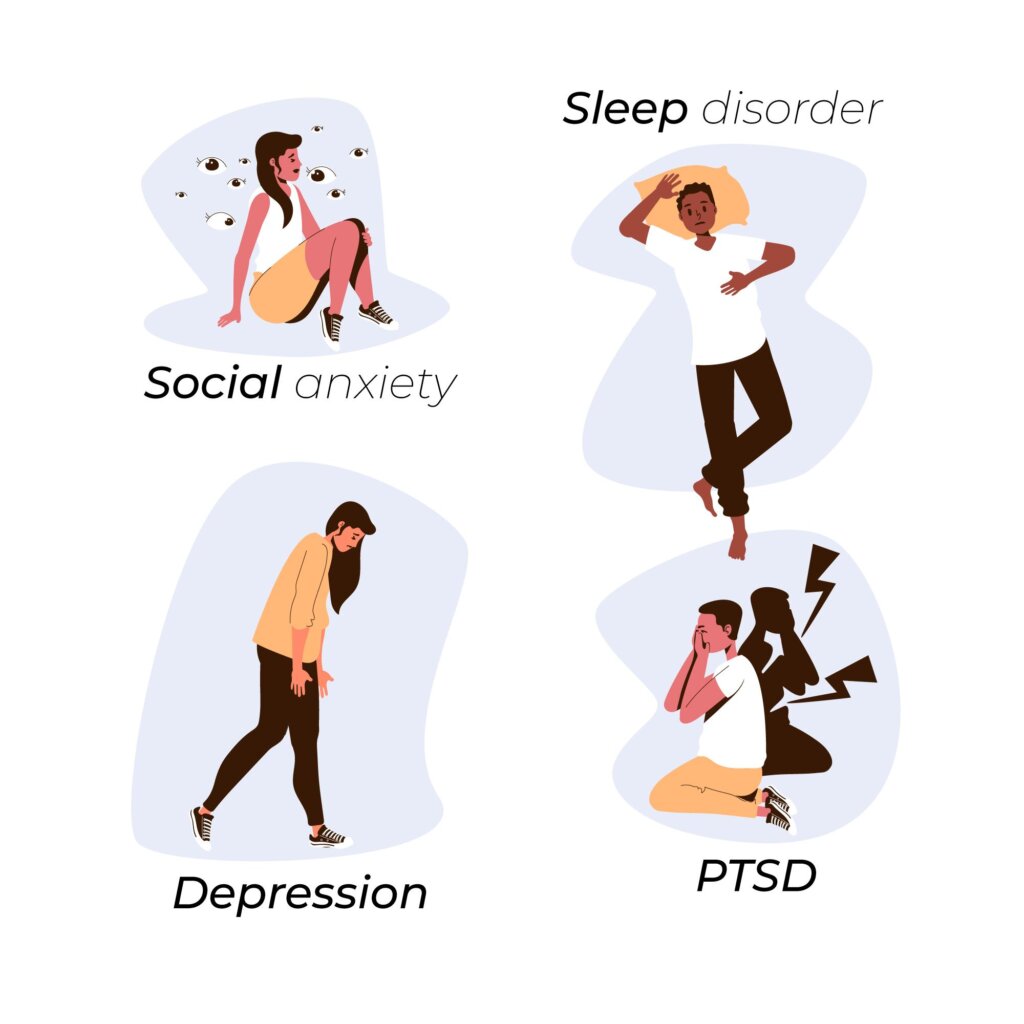Have you ever found yourself in a deep, dark depression slump, where even the simplest tasks feel like an insurmountable challenge? If so, you’re not alone.
Depression is a very common and complex mental health condition that can leave us feeling trapped in a seemingly endless cycle of hopelessness and despair.
But the good news is, there is a way out. With the right strategies and a little bit of self-compassion, you can break free from the grip of depression and rediscover the sunshine within.
In this article, we’ll explore the steps on how to get out of a depression slump and reclaim your inner joy.
Seek Professional Help Free of Cost : Visit here to apply for counselling.
What is depression slumps?

A depression slump is a period of time when the symptoms of depression feel particularly overwhelming.
During this time, you may experience a deep sense of sadness, a lack of motivation, and an inability to find pleasure in the activities you once enjoyed.
It’s important to understand that a depression slump is not a permanent state, and with the right support and self-care, you can emerge from it.
signs of a depression slump

The first step in overcoming a depression slump is to recognize the signs that you’re in one. Some common symptoms of a depression slump include:
- Persistent feelings of sadness, hopelessness, or emptiness.
- Lack of energy or motivation to complete even basic tasks.
- Difficulty concentrating or making decisions.
- Changes in sleep patterns, like sleeping too much or not enough.
- Significant weight changes, either loss or gain.
- Feelings of worthlessness or excessive guilt.
- Recurring thoughts of death or suicide.
If you are experiencing any of these symptoms, you should take them seriously and get help.
How to Get Out of a Depression Slump (15 Ways)
Depression can be challenging, but there are several ways that can help you overcome a depression slump. Here are fifteen effective strategies:
1. Identify and Avoid Triggers – Recognize specific factors that trigger depression and work on avoiding them.
Seeking support from family and friends can also help reduce relapse risks.
2. Maintain Healthy Routines – Prioritize adequate sleep, regular exercise, and self-care activities to reduce the impact of depression triggers.
Incorporate new activities that bring joy and fulfillment into your routine.
3. Evaluate and Adjust Treatment Plan – If the current treatment plan isn’t effective, consider seeking a new treatment approach, including changes in medication or therapy.
It’s essential to find a treatment plan that works for you and stick with it.
4. Understand and Accept Depression – Recognize that depression is a chronic illness and that relapse is common.
Accepting this fact can help in actively managing and working on the condition every day.
5. Separate Yourself from Depression – Understand that depression does not define you as a person. Recognize and focus on your strengths and positive qualities.
Remind yourself of your roles and positive attributes beyond the illness.
6. Practice Mindfulness – Regularly engage in mindfulness activities to appreciate the present moment and reduce negative responses to low mood.
Meditation can help to eliminate the symptoms of depression and improve overall well-being.
7. Make a Bedtime Routine – Establish a consistent bedtime routine to improve sleep quality, which can significantly impact mood and mental health.
Consider relaxing activities such as sipping herbal tea or reading a book before bedtime.
8. Exercise Regularly – Regular exercise releases endorphins, which can help boost mood and reduce symptoms of depression.
Exercise has been shown to have a significant effect on alleviating symptoms of depression.
9. Avoid Alcohol – Alcohol is a depressant and can trigger or worsen episodes of depression.
It’s important to minimize alcohol consumption to avoid exacerbating depressive symptoms.
10. Record the Positives – Keep a positivity journal or gratitude journal to focus on the positives and build self-esteem.
Acknowledging and recording positive experiences can help counteract the focus on negatives during depressive episodes.
11. Social Support Network – Cultivate and maintain a strong support network of friends, family, and peers who understand your condition and can provide emotional support.
Regular interaction and open communication with a supportive network can be instrumental in preventing relapse.
12. Healthy Boundaries – Establish and maintain healthy boundaries in relationships to avoid emotional stress and conflicts that may contribute to depression relapse.
Learning to say “no” when necessary and setting clear limits can help improve emotional well-being.
13. Mindful Nutrition – Pay attention to your diet and incorporate mood-boosting foods such as omega-3 fatty acids, whole grains, and foods rich in antioxidants.
A well-balanced, healthy diet can improve your mental health and lower the likelihood of relapse.
14. Engage in Meaningful Activities – Participate in activities that provide a sense of purpose and fulfillment, such as volunteering, creative hobbies, or helping others.
Contributing to something meaningful can enhance self-worth and reduce the likelihood of relapse.
15. Regular Mental Health Check-Ins – Schedule regular check-ins with your mental health professional, even when you’re feeling well.
This proactive approach can help identify potential triggers and address concerns before they escalate.
Remember, depression triggers are personal and can change over time, it’s crucial to be patient with yourself and seek expert help if you’re suffering from depression. These strategies, along with the guidance of a healthcare professional, can contribute to overcoming a depression slump.
Related Article : Beat the Chill : 10 Effective Ways on How to Stop Anxiety Chills!
Seeking professional help

While it’s possible to overcome a depression slump on your own, it’s often helpful to seek the guidance of a mental health professional.
A therapist or counselor can provide you the tools and support you need to help with your depression.
They can also assist you in developing a treatment strategy that could include therapy, medication, or both.
Self-care strategies To Overcome depression

In addition to getting professional help, there are various self-care options you can implement to help you get out of a depression slump. These include:
Setting realistic goals and expectations
When you’re in the midst of a depression slump, it’s important to set realistic goals and expectations for yourself.
Don’t try to tackle everything at once; instead, focus on small, achievable tasks that can help you feel a sense of progress and accomplishment.
Building a support network
Surrounding yourself with supportive friends, family members, or even online communities can be incredibly helpful in overcoming a depression slump.
These people will listen to you, provide encouragement, and help you feel less alone in your struggle.
Finding motivation and inspiration
It can be challenging to find the motivation to take care of yourself when you’re in a depression slump.
Try to identify activities or hobbies that you once found enjoyable and make a plan to incorporate them back into your routine.
You can also take inspiration from books, podcasts, or online resources that focus on personal growth and well-being.
Exploring new hobbies and interests
Sometimes, the key to overcoming a depression slump is to try something new.
Explore hobbies or activities that you’ve never tried before, such as painting, gardening, or learning a new language.
Engaging in novel experiences can help you feel a sense of excitement and accomplishment.
Creating a routine and sticking to it
Creating a routine can offer a sense of structure and stability during a depression slump.
This might include setting regular sleep and wake times, scheduling meals, and incorporating physical activity into your day.
Celebrating small victories
It’s important to recognize and celebrate the small victories you achieve along the way.
Whether it’s completing a task you’ve been dreading or simply getting out of bed in the morning, acknowledging your progress can help boost your self-confidence and motivation.
Embracing positivity and gratitude
While it may be challenging, try to shift your mindset towards positivity and gratitude.
This can involve keeping a gratitude journal, practicing mindfulness, or focusing on the things you’re grateful for in your life.
Conclusion
Overcoming a depression slump is no easy feat, but with the right strategies and support, it is possible. By recognizing the signs, seeking professional help, and implementing self-care techniques, you can take the first steps towards reclaiming your inner sunshine and finding your way back to a happier, more fulfilling life. Find more blog posts like this on our Articles page.
Remember, you don’t have to go through this journey alone. If you’re struggling with depression, don’t hesitate to reach out for help. Whether it’s connecting with a mental health professional, joining a support group, or simply talking to a friend, there are resources available to support you. Take the first step towards your recovery today and let’s work together to rediscover your inner light.
FAQ’s

1. What are the most effective strategies for overcoming a depression slump?
- Effective strategies include cognitive behavioral therapy, self-care practices, exercise, maintaining social connections, and seeking professional help when necessary.
2. How can I help a loved one who is struggling with a depression slump?
- Offer your support and understanding, encourage them to seek professional help, and assist them in maintaining healthy routines and social connections.
3. Are there any natural remedies or lifestyle changes that can help alleviate a depression slump?
- Lifestyle changes such as regular exercise, a balanced diet, mindfulness practices, and engaging in meaningful activities can help alleviate the symptoms of a depression slump.
4. What role does professional therapy play in overcoming a depression slump?
- Professional therapy, such as cognitive behavioral therapy (CBT) or counseling, can provide individuals with the tools and support needed to address the root causes of their depression and develop coping strategies.
5. How can I prevent a depression slump from recurring in the future?
- Preventing a depression slump from recurring involves maintaining healthy routines, staying connected with a support network, identifying and managing triggers, and seeking professional help if early warning signs emerge.
6. What are some self-care practices that can help lift me out of a depression slump?
- Self-care practices such as getting adequate sleep, setting achievable daily goals, practicing relaxation techniques, and engaging in activities that bring joy can contribute to lifting you out of a depression slump.
7. How can I stay motivated to implement these strategies when I feel overwhelmed by my depression slump?
- Staying motivated can be challenging, but setting small, achievable goals, seeking support from loved ones, using positive affirmations, and celebrating small victories can help maintain motivation during a depression slump.








